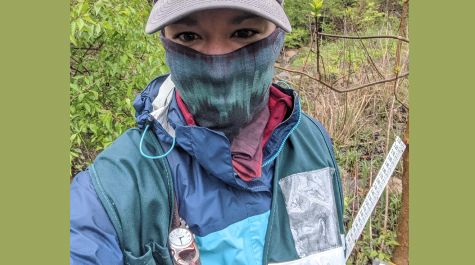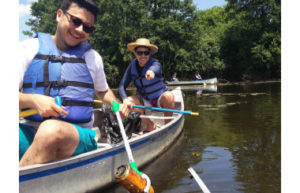Since early-March HRWC has been preparing for an augmented field season. Here’s a look at how our staff is thinking about implementing field work, while keeping everyone safe and meeting the ever changing rules and recommendations related to the COVID-19 pandemic.
Every winter, program managers plan HRWC’s field-data collection needs for the coming season. How many sites need water chemistry sampling in each of the major counties? How many miles of creek will summer interns walk, checking for erosion and stream geomorphology? What pilot programs, like microplastics monitoring, require new procedures? After a few years of coordinating, we have become quick at gaining a solid sense for what we will do and when, and then determining how much assistance we need from volunteers and interns.
This summer, of course, is different. In early March we learned that we would need to cancel some events, postpone some work, and alter our procedures to keep our people safe. The first changes we made: 1. We took our Chemistry and Flow program’s season opening orientation virtual. (We take pride that we were on Zoom before everyone got tired of it!) 2. We canceled our spring River Roundup. We have canceled only one other benthic collection in the past 28 years and that was due to the polar vortex and -20F temps.
Changing Summer Volunteer Programs and Data Collection
 Over the past two months HRWC staff have diligently watched our peers and other industry leaders to see how they were adapting their field season. Many of the government agencies have closed much or all of their non-essential field work, for most or all of the summer. Many made large events virtual. And tons of online engagement sprung up. Realizing that many of our volunteers are among vulnerable populations and we always prioritize safety for our volunteer events, we created a risk-averse approach to all field work that we were planning. This required us to curtail our volunteer programming and implement as many pandemic best practices as possible. For example, even if the K-12 schools weren’t closed, we cancelled our STEM education programming. The hands-on learning that HRWC uniquely delivers to students simply can’t be done without youth and our volunteers being close to each other.
Over the past two months HRWC staff have diligently watched our peers and other industry leaders to see how they were adapting their field season. Many of the government agencies have closed much or all of their non-essential field work, for most or all of the summer. Many made large events virtual. And tons of online engagement sprung up. Realizing that many of our volunteers are among vulnerable populations and we always prioritize safety for our volunteer events, we created a risk-averse approach to all field work that we were planning. This required us to curtail our volunteer programming and implement as many pandemic best practices as possible. For example, even if the K-12 schools weren’t closed, we cancelled our STEM education programming. The hands-on learning that HRWC uniquely delivers to students simply can’t be done without youth and our volunteers being close to each other.
From a data collection standpoint, we realized we would be under-resourced and likely drastically limited in time. HRWC program managers quickly determined our minimum delivery for the season. It looked like we could accomplish the bare minimum in field work with only staff and a few key volunteers or interns. We next developed new policies for pandemic safety procedures related to field work. All the typical things – social distancing, masks, disinfecting equipment between users, and the like. We are already practiced at disinfecting our equipment to prevent the transfer of invasive species and aquatic pathogens. Now we are disinfecting the human end of our equipment too. HRWC staff have been proud to share these procedures with peers to help them prepare for their field seasons too.
Finding New Socially Distant Opportunities
 More recently, staff have been evaluating virtual and remote projects that our volunteers and supporters can do to help our field season. Historically, we have shied away from virtual engagement, focusing on helping watershed residents participate directly with the river and its tributaries. HRWC’s 50 for 50 campaign, which challenged folks to pick up trash (50 pieces) for the 50th anniversary of Earth Day, was the first remote, and thus socially distanced, initiative you may have noticed. Program managers are now preparing additional opportunities, such as do-it-yourself river cleanups, natural areas monitoring through apps, and water level and temperature reporting.
More recently, staff have been evaluating virtual and remote projects that our volunteers and supporters can do to help our field season. Historically, we have shied away from virtual engagement, focusing on helping watershed residents participate directly with the river and its tributaries. HRWC’s 50 for 50 campaign, which challenged folks to pick up trash (50 pieces) for the 50th anniversary of Earth Day, was the first remote, and thus socially distanced, initiative you may have noticed. Program managers are now preparing additional opportunities, such as do-it-yourself river cleanups, natural areas monitoring through apps, and water level and temperature reporting.
Moving Forward
As of May 8, 2020, work that is exclusively out-of-doors, is allowed to resume in Michigan. In these final weeks of May, we are sending small teams of select individuals into the field to start our data collection season. And more importantly, test run our pandemic safety procedures. Initial outings have provided great information that we are incorporating before we bring on more summer interns and volunteers. At that time, we’re hopeful that all of our planning will ensure that we can capitalize on the remainder of the field season. We’re also very excited that going forward, we will have discovered better safety practices and developed more ways to engage watershed residents in helping protect the Huron River.



